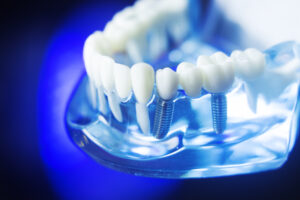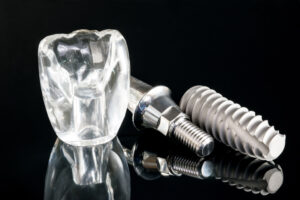For many years, there was one main option for patients missing a tooth: replace it with a bridge. In recent decades, dental implants have become an increasingly-popular alternative option for tooth replacement. Implants are the next best thing to natural teeth, making them a top choice of dentists and oral surgeons, but they’re not the right solution for every patient.
This is what you need to know before making a decision on whether to replace your tooth with a bridge or an implant.
The Benefits of Dental Bridges
There are a few different types of dental bridges, but generally speaking, a bridge consists of two supports, also known as abutments, attached to adjacent teeth with a pontic, or replacement tooth, joining the two together. A bridge gets its name because it bridges the gap in your teeth. In a traditional bridge, the abutments are usually dental crowns. Another option is a Maryland bridge, which secures a metal or porcelain framework onto the abutment teeth; this is more affordable, but not as strong as a traditional bridge. When a third molar is missing and there is only one adjacent tooth, a cantilever bridge is used.
The Benefits of Dental Implants
Why do dental professionals recommend implants over other options for tooth replacement? It’s because implants are the only option that replaces both the root and the crown of a tooth. This is critical because it prevents bone loss in the jaw unlike a dental bridge. It also makes dental implants much more stable in the mouth. In addition to single tooth dental implants, there are also options for implant-supported dentures and a full arch of teeth with as few as four implants.
An exciting alternative for patients with three or more missing teeth is the implant-supported bridge. It’s a hybrid option that replaces the two outermost missing teeth with dental implants. These implants act as the abutments to support a bridge. This offers more stability than a bridge anchored in place by crowns, but it’s more economical than replacing each individual tooth with its own implant.
Dental Implants vs. Bridge: Which Is Right for You?
This article is intended to give you a quick primer on the pros and cons of bridges and implants, but the best way to know which option is the right fit for your unique situation is to meet with a dentist for an evaluation.
Champagne Smiles, also known as New Jersey’s Premier Dental Implant Team, offers dental implants and bridges at its convenient Morganville, NJ location. For more information about what Dr. Richard Champagne and our team at Champagne Smiles can do for you, call today and request an appointment.




